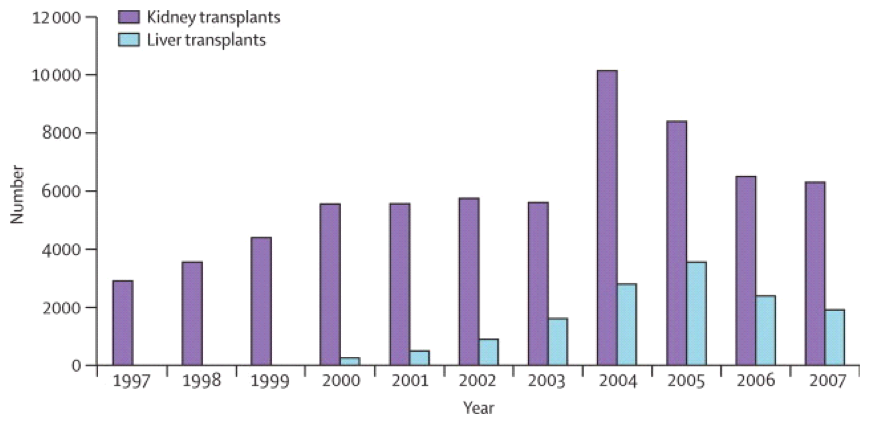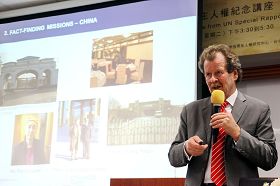How Did a Prestigious Medical Journal Become a “Hostile Force”?
(Minghui.org) At the end of February 2013, media in China reported widely on the Video Conference of the National Human Organ Donation Task Force, which was jointly held by the Ministry of Health and the Chinese Red Cross Society.
According to media reports, Deputy Health Minister Huang Jiefu once again admitted, “Our country is the only one in the world to systematically use organs of death-row prisoners.” He also said, “International hostile forces try to expand on this issue [the use of organs from executed prisoners], ...they have opposed all of our published works on organ transplantation in China. The principle they hold is that of no acceptance, no publication, and no cooperation.”
The “hostile forces” referred to by Huang Jiefu include one of the most prestigious medical journals in the world, The Lancet. In October 2011, The Lancet published an article that called upon the international community to reject China's use of organs from death-row prisoners, and at the same time, it appealed to the medical community to take a stand of “no acceptance, no publication and no cooperation” regarding China's organ harvesting research and publications.
In the area of medicine, doctors must adhere to fundamental professional ethics. The Lancet thus rejected the work of its “colleagues” in organ transplantation in China because of ethics. The Chinese Communist Party's (CCP) so-called “voluntary organ donation by death-row inmates” is only a cover to conceal its practice of harvesting organs for exorbitant profits. Moreover, the facade of “organ donation by death-row inmates” cannot explain the explosive increase in the number of organ transplants in China after the year 2000.

Figure 1: Kidney and liver transplants (1997 to 2007)
Source: “Government policy and organ transplantation in China”
by Huang Jiefu, 2008 I
Such concerns from the international medical community were triggered mostly by China's organ transplant data. According to data published by the CCP regime, surgeons in China performed 18,500 organ transplants between 1994 and 1999. Between 2000 and 2005, the number of organ transplants increased to over 60,000, which is more than three times the number of transplants conducted in the previous six years. According to reports on China Daily, in 2006 alone, as many as 20,000 organ transplants were conducted.
The international medical community is very much aware that the lack of donors is the most difficult issue facing organ transplantation around the world. How could China break through such a bottleneck in six years? During the two six-year periods (1994-1999 and 2000-2005) the number of death-row inmates did not increase threefold. So where did the additional 41,500 organs come from?
In March 2006, two witnesses stepped forward to claim that CCP-run hospitals, forced labor camps, prisons, and the armed police collaborated in secret with one another in their harvesting organs from living Falun Gong practitioners on a large scale for profit.
In July 2006, Mr. David Kilgour (former Canadian Secretary of State for Asia-Pacific) and Mr. David Matas (renowned international human rights attorney) published a report based on their independent investigation into allegations of organ harvesting. The report concluded that the Chinese Communist regime has been harvesting organs from Falun Gong practitioners. Their applications for a visa to travel to China to investigate the allegations were rejected, so they based their deductive investigation on evidence gathered through 52 indirect means: from doctors and patients, from witnesses and reports openly published in China, as well as investigations conducted by phone calls to China. In the end they came to the conclusion that “there has been and continues today to be large scale organ seizures from unwilling Falun Gong practitioners.”
After the publication of their report, international medical professionals assessed the credibility of these accusations from a professional angle. For example, the Journal of The Royal Society of Medicine published an article by organ transplant surgeon Dr. Tom Treasure (Treasure T.: The Falun Gong, organ transplantation, the holocaust and ourselves. J R Soc Med 2007; 100(3): 119–21), which says, “The element of the story that horrifies me most, if it is true, is that it is my medical colleagues, the doctors, who perpetrate these acts. This is the only element that I have the capacity to address. While I cannot get more evidence than has already been offered, I can at least test this allegation for credibility.”
In the article, Dr. Tom Treasure confirmed the plausibility of the investigation report by Mr. Kilgour and Mr. Matas, “What makes it credible is the numerical gap between the reported number of transplants compared with what is possible in other countries, the short waiting times and the confidence with which operations are offered in the global health market, and the routine blood testing of the Falun Gong.”
Other medical professionals came to the same conclusion after their independent examinations of the report. Professor Kirk Allison (Director of the Program in Human Rights and Health, School of Public Health; and Associate Director of the Program in Human Rights and Medicine, Medical School, University of Minnesota) testified at a hearing on September 29, 2006 that was held by the United States Congress on allegations that the CCP has been harvesting organs from living Falun Gong practitioners.
Professor Kirk Allison put forward his own investigation and analysis in relation to the accusations against the CCP. He also testified that “the most compelling evidence has been compiled by David Kilgour and David Matas in the Report into Allegations of Organ Harvesting of Falun Gong Practitioners in China of July 6, 2006.”
(http://organharvestinvestigation.net/events/allison-092906-to-us-congress.pdf)

Manfred Nowak, renowned human rights expert and former UN Special Rapporteur on Torture
Professor Manfred Nowak, former UN Special Rapporteur on the Question of Torture and a renowned international human rights expert, spoke about the CCP's most evil means of “torture” -- harvesting organs from living Falun Gong practitioners -- when giving a speech at Taiwan University in 2011. He called such accusations “credible”.
In his report to the UN assembly in 2007, Professor Manfred Nowak listed a number of organ transplantation centers and detention centers in China that were accused of participating in harvesting organs from Falun Gong practitioners. On December 21, 2008 the United Nations Committee against Torture specifically requested that the CCP investigate the charges that Falun Gong practitioners were tortured and their organs harvested. The committee also requested that China bring the persons in charge of any such persecution to justice.
After exposure in 2006 of the CCP's crimes of harvesting organs from Falun Gong practitioners, the number of organ transplants in China immediately reduced by half that year, and there were further decreases in the following years. This indirectly shows that under enormous pressure from the international community, the CCP dares not commit crimes as flagrantly as they used to.
The rejection of Chinese “colleagues” by the international medical community is based on professional ethics and conscience. Dr. Tom Treasure's article particularly mentioned that Nazi doctors had become accomplices in their crimes.
The real “hostile forces” are those medical professionals who betrayed their consciences under pressure by the CCP or because they were tempted by greed, and it is these Chinese transplant surgeons who are hostile towards the fundamental ethics of medicine and humanity. The CCP is a “hostile force” towards human conscience in the truest sense.